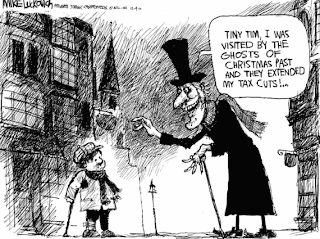
Friday, December 10, 2010
Does change still count? Cents, charity, community
If you're like many people, you have a container filled with loose change from your cash transactions. Depending on the size of your container, from a coffee can to a wine jug, you could have the metallic equivalent of some “greenback” Andrew Jacksons ($20) or the elusive Benjamin Franklins ($100). That could certainly buy s ome warm clothing or a good meal for some people who need it.
ome warm clothing or a good meal for some people who need it.
As an AmeriCorps VISTA volunteer living on a poverty level income, my spare change is mostly pennies. I've used all my silver-colored coins for parking meters and library fines. At first glance the pennies look impressive, they feel solid and heavy, but they don't actually add up to much. Only a few businesses still believe in the capital power of those little copper coins. You can't use them in parking meters. They are bulky and take time to count. Some banks won't even exchange them for bills; they'll only take coins for deposit if you have an account with them.
In December 2009 CNN Money reported on a Federal Deposit Insurance Corporation (FDIC) study finding that 17 million Americans don’t have bank accounts. That’s “nearly 20% of all U.S. households earning $30,000 or less per year” who save their pennies at home. Even if each household had a dollar’s worth of pennies in the cookie jar, that’s $17,000,000 not working in our bank-based economy. It’s not gaining interest, not being used to fund businesses, home loans, car loans, educational loans, non-profits. Spare change adds up.
Initiatives like BankOn Kalamazoo County are designed to bring some of that loose change back into the mainstream economy. BankOn gives qualified people with low-incomes and/or poor-credit access to a more prosperous future, helping them establish or re-build their credit scores, through financial literacy training and low-fee or no-fee bank accounts. (For BankOn financial literacy classes, check out the Kalamazoo Neighborhood Housing Services schedule.)
As for me, I’m not sure where I will donate my accumulation of coins this year. It will be for the common good of the community. It’s a personal choice, of course, as are all financial decisions. I’m thankful I have some change I can share.
Tax Refund Anticipation Loans: High Interest & Fees for the Working Poor

Tax season won't be underway until January, but there was a big line Thursday in front of one H&R Block branch (in Wyoming, Michigan).
The company has been pushing its line of credit called the Emerald Loan, (an income tax refund anticipation loan or RAL). Typically, the market for these products are low-income earners who often get tax refunds that can be used to pay off the loan, consumer groups say.
But there is some concern customers may be purchasing expensive tax preparation services they can't afford, or digging themselves deeper into debt.
www.woodtv.com/dpp/your_money/Loans-from-tax-prep-chains-Demand-up
The Better Business Bureau:
“RALs are short-term loans with exorbitantly high interest rates and hidden administration fees, so consumers are actually paying someone else to have access to their own money.
However, if the refund is less than anticipated or the RAL is not paid off in time, the fees can take a significant chunk out of the refund.”
A RAL is similar to a payday loan, with interest rates averaging between
50 and 500 percent.
They sometimes are offered by fly-by-night tax preparers. Consumers still can obtain income tax refunds, free of charge if they are willing to wait two weeks...
The fastest and most secure way for consumers to receive a tax refund directly is to file tax returns online and allow direct deposit of
ct.bbb.org/article/income-tax-refund-anticipation-loans-15231





